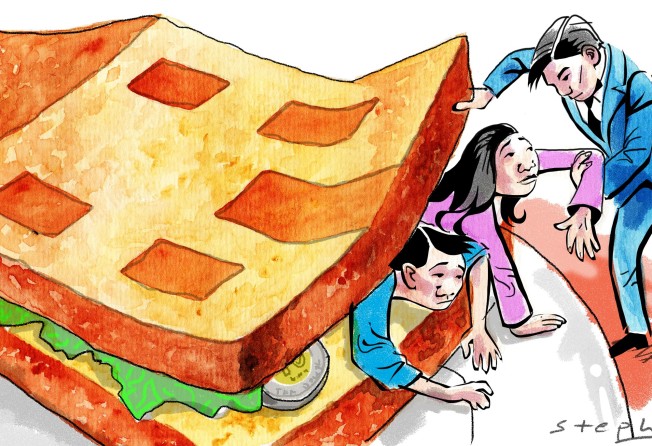Carrie Lam’s focus on affordable housing in Hong Kong will finally help the squeezed ‘sandwich’ class
Ken Chu welcomes the chief executive’s initiatives on housing, especially for young families, as they will benefit the often-neglected ‘sandwich class’ and reinstate their faith in the city’s future

It was during her election campaign that Chief Executive Carrie Lam Cheng Yuet-ngor first floated the idea of launching affordable homes for families struggling to buy flats at market rates.
Recently, she shared the basic concepts of her Starter Homes Scheme, which aims to enable these families to purchase a flat at prices lower than market rates.
The scheme will be targeted at permanent residents of Hong Kong. To qualify, they must be first-time homebuyers. According to Lam, the primary targets are young families who would be able to purchase a private flat at an affordable price.
In addition, according to reports, restrictions will be imposed on these homeowners if they want to resell the subsidised units, to prevent them from making huge profits at the expense of others in society.
At a housing forum earlier this month, Lam further described the targeted young families as those who are not only ineligible to apply for public rental housing or the purchase of Home Ownership Scheme (HOS) flats, but who are also unable to afford private housing despite their “decent” income. Let’s call this group the “sandwich class”, if you will.
Chief Executive Carrie Lam highlights concerns over high property prices
Lam has also said the government is likely to consider a public-private partnership format to launch the scheme. Reports suggest the government will consider allowing private property developers to develop their land reserves at a lower land premium, in exchange for setting set aside a number of flats for the Starter Homes Scheme.
Some, however, argue that the plan is unfair to other classes in society, because those who will benefit already hold well-paid jobs and are within the top 10 to 15 per cent of income groups in the city.
I disagree. I trust that the chief executive has not singled out this group to the exclusion of others in society. For example, Lam has already pledged to increase the number of units for the so-called “green form subsidised home ownership pilot scheme” – to encourage public housing tenants to buy subsidised flats at a discount to the market price and so free up public rental housing units for those in need.
The government also recently announced plans to work with NGOs to launch legalised subdivided flats – under the so-called “social housing pilot scheme” – for those currently on the public housing waiting list.
Further, Lam has not lost sight of the acute shortage of land, which has sent private home prices skyrocketing beyond the reach of ordinary residents, while slowing down the building of more public housing flats for low-income families.
Why is housing in Hong Kong so expensive?
Given this scenario, Lam has formed a task force for exploring all options to increase land supply and launch a territory-wide debate, in an attempt to reach a consensus on the best approach to tackle the problem.
Besides, she has repeatedly emphasised that land earmarked for public housing will not be used for the starter home plan. Indeed, a public-private partnership approach implies the scheme will not compete for public land, as only private land will be enlisted.
It must be noted that the well-being of the so-called “sandwich” or middle class in Hong Kong has been neglected for too long. They deserve help, as much as the grass roots do.
History shows that the existence of a strong and law-abiding middle class is a stabilising force in society. It is the driving force behind its growth and prosperity. Sadly, our “sandwich” class has suffered the effects of economic downturns over the years, without enjoying much in the way of social welfare or benefits.
The birth of Hong Kong’s middle class: Mei Foo Sun Chuen
Members of our middle class, despite holding a decent job, find it almost impossible to afford a flat these days in Hong Kong’s exorbitantly expensive housing market. A survey by the international real estate consulting firm Demographia early this year revealed that the average price of a private home in Hong Kong was 18 times the median annual household income.
Hong Kong property rents and prices since 2011
In other words, only if someone were to stop all spending on food, drinks and holidays for 18 straight years could they hope to buy a private home in costly Hong Kong.
At the very least, offering a helping hand to our young families as they chase their home dreams is one way to ease their frustration, as well as “reignite” their hopes for the future of the city.
Certainly, the government must consider the feasibility of every public policy initiative as, very often, failure to take heed of the technical details will ultimately diminish the effectiveness of any such initiative.
There are a number of technical matters to tackle in the case of starter homes
There are a number of technical matters to tackle in the case of starter homes, including at which price they will be sold, what the upper income ceiling will be for applicants, whether there will be a minimum holding period, and what sort of restrictions will be imposed to prevent people from profiting at the expense of taxpayers when they sell these homes.
However, I am confident that Lam’s administration has the capability and wisdom to roll out an effective starter home scheme for our young middle class who will become the pillars of society in the future.
Dr Ken Chu is group chairman and CEO of the Mission Hills Group and a National Committee member of the Chinese People’s Political Consultative Conference